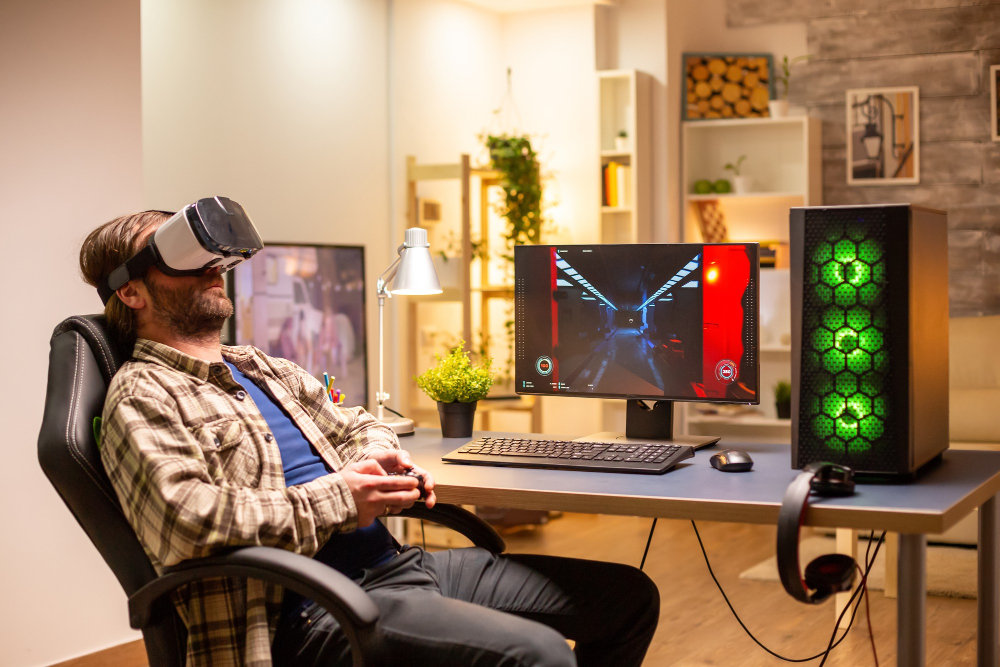Gaming has grown exponentially since its introduction decades ago; in fact, gaming in terms of table games, sports games, etc., has been with humanity for thousands of years. There’s probably something deep in human nature that makes us playful and at the same time gives us this gambling feeling of competition, guessing the best option, or hoping for a chance. Video games, traditional table games, sports competitions, and casinos with no deposit bonus trigger similar mechanisms and can be considered “games” for us humans.
Speaking of video gaming as we know it today, statistics show that over 2.7 billion people worldwide indulge in video games in all forms. We don’t have to wonder much about this because besides gaming being part of our human lives throughout our history, modern video games are outstandingly beautiful, engaging, captivating, and entertaining.
Knowing what we know now about the hormones of dopamine, serotonin, and other “happiness hormones” that the human brain releases to the relevant stimuli, the appeal of video games and gaming is not surprising at all. But does it affect our behavior as much as it affects our minds? Does gaming impact our society on any bigger scale? Let’s find out.

Post Contents
The Appeal of Gaming
The appeal of gaming is a multifaceted phenomenon that has rooted itself in our culture – in both modern and historical terms. It’s more than just a fun way of spending free time; it’s about an escape from reality, a chance to test our skills and strategies, and a way to connect with friends or strangers. Gaming has always been a way of connection in a group.
The diversity of gaming genres and platforms today is staggering, ranging from action shooters to slow-paced simulations. Modern games allow an array of virtual experiences – role-playing, puzzles, mystery, adventures, sports, warfare – so there is a game for everyone.
The revenues of the gaming industry, with all its niches and sub-niches included, have long ago surpassed the $150 billion mark, making the gaming and entertainment sector bigger than movies and mosaic together. Video gaming and especially mobile gaming has seen a huge explosion in popularity and demand, and if you think about it, gaming should be taken seriously. For some, this is a way to kill time while commuting, but gaming in general has become a cultural phenomenon creating communities and new markets.
It is not a stupid or meaningless hobby anymore. Gaming includes people of whatever age, gender, and background, and has no borders. Besides creating new markets like game-related and game-inspired products, gaming brings people together, shapes culture and therefore society, and even brings substantial revenue to skillful and famous players. So this phenomenon has a powerful force to shape the society.
The diversity of gaming genres and platforms today is staggering, ranging from action shooters to slow-paced simulations. Modern games allow an array of virtual experiences – role-playing, puzzles, mystery, adventures, sports, warfare – so there is a game for everyone. For those who enjoy a thoughtful and relaxing challenge, playing online mahjong puzzles can be a great way to unwind and keep the mind sharp.
The Neuroscience Behind Gaming
When we play, our brain’s reward system is set into motion, releasing dopamine, a chemical messenger within the system. This neurochemical, often associated with pleasure and motivation, surges when we achieve in-game goals or overcome obstacles, creating a sense of accomplishment and satisfaction.
Furthermore, gaming can result in a psychological state known as “flow,” where players become deeply immersed in the game. Achieving flow requires intense focus and a loss of self-awareness. This is a state of optimal engagement in the process that allows one to escape reality and gives a sense of control over things that many people lack.
In addition to momentary pleasures, gaming has been linked to lasting effects on brain plasticity and cognitive functions, like visual memory or problem-solving. However, the negative effects on cognitive functions, mental health, and physical health are way more overwhelming than the minimal memory improvement achievements that have very narrow applicability in real life. The appeal of gaming in terms of satisfaction and pleasure can turn out so much more powerful than other sources of pleasure like sports, achievements in real life, or social interactions, that players will be willing to sacrifice all those things to gaming.
Psychological and Social Aspects of Gaming
To be honest, it must be said that such a situation is not always the player’s “fault” or a symptom of the player’s “weakness” to withstand the attraction of a video game. Some people, like in the case of other dopamine-caused addictions and addictions in general, are just more inclined to become addicted to certain substances, or better say, certain hormones that their brain releases. Other players may feel that their life circumstances are so unfortunate that gaming may feel like the only legal temporary escape they have.
Within the realm of video games, players often experience a spectrum of emotions, ranging from exhilaration and triumph to frustration and anxiety. These emotional ups and downs are integral to the nature of gaming, creating a unique form of entertainment that is physiologically emotion-causing. Escapism thus stands out as one of the most prominent concepts of gaming psychology, looking for an emotional journey that is different than the one the person experiences in real life.
In terms of social interactions and behavior, gamers often find themselves bonding over shared interests, forming friendships, and even building lasting relationships. Multiplayer and cooperative gameplay mechanisms can foster the social experience, enabling players to collaborate, strategize, and communicate online, without even seeing each other, often across geographical boundaries.
Today, many studies explore the relationship between gaming and behavior. While the theory about increased aggression due to gaming is still being researched, there are many positive outcomes of pro-gaming experiences that promote cooperation, problem-solving, and empathy.